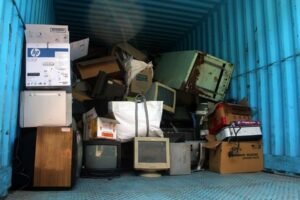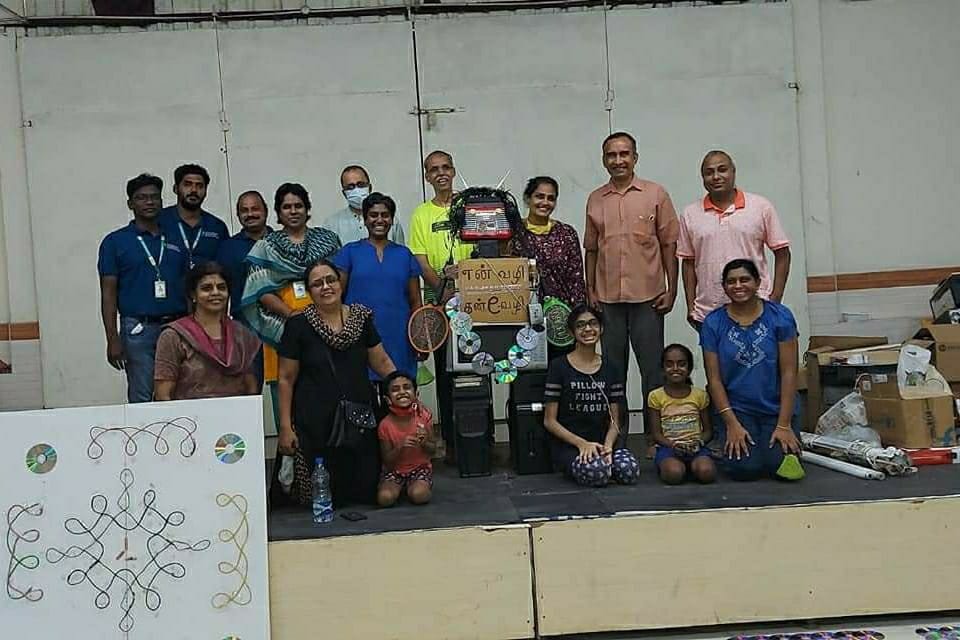Read in : தமிழ்
India stands third in the world when it comes to generating e-waste. In India, Mumbai tops in generating e-waste followed by Delhi, Bengaluru, Chennai, Kolkata, Ahmadabad, Hyderabad, Pune and Surat. The usual electronic items found in e-waste are keyboards, mobiles, batteries, switchboards, motherboards, laptop and desktop items.
Leaving aside the plastic component that is in any case a menace, the chemical contamination by e-waste of soil and eventually water sources can turn deadly, warn experts. Lithium, copper, mercury, lead and chromium that go into making the devices are all toxic to the environment.
Extensive e-waste rules have been formulated by the central government including fixing responsibility on manufacturers of electronic equipment. But the mechanism of collection and disposal is yet to function seamlessly. Retired professor at the Madras Institute of Development Studies, S Janakarajan, says that the state government has to form an expert panel to suggest practical ways to deal with e-waste.
The chemical contamination by e-waste of soil and eventually water sources can turn deadly
Meanwhile, there are non-governmental organizations working on this front. Residents of Kasturba Nagar Association (ROKA) is one such organization. Some of the residents from Kasturba Nagar in Adyar have formed a group that collects e-waste from people and hands them over to city corporation.

E-waste collected by ROKA includes keyboards, mobiles, batteries, switchboards, motherboards, laptop and desktop computers.
The organization has been functioning since 2019. The volunteers guided by general secretary Sridharan and secretary Janani go to households collecting e-waste.
Toxic heavy metals like mercury, lead, copper, lithium, barium are all part of e-waste. They can contaminate land and water sources. When e-waste is burnt, the toxic emission can cause serious air pollution. “The e-waste can contaminate air, water and land. So, we need to be careful dealing with them,” says Khushbu Birawat, assistant professor at Global Academy of Technology, Bengaluru.
People don’t realize the deadly nature of e-waste and discard them at will. Most of the time, e-waste is discarded along with regular trash which should be avoided, she says.
Chennai, as an industrial hub, generates a huge volume of e-waste. For instance, solar panels are becoming very popular but there is no clarity to deal with the solar cells once they go defunct. So are electric vehicles. How are we going to discard the defunct batteries used in these EVs?
With tonnes of e-waste piling up in Chennai houses, the City Corporation should set aside specific dates or collection points to collect e-waste from the public and companies — Sivakumar Jayaraman, civic activist
One practical way could be civic bodies setting aside a day in the week to collect e-waste. “People are clueless about e-waste disposal. They don’t know how to discard them,” says Sivakumar Jayaraman, a civic activist.
With tonnes of e-waste piling up in Chennai, the City Corporation should set aside specific dates or collection points to collect e-waste from the public and companies, he says.

E-waste collected by ROKA last year being sorted by volunteers
Janakarajan warns that we may end up amidst e-waste piles just like plastic waste. During the initial days, plastic was considered convenient but the prolonged use and misuse have left us choking in plastic waste. “We still don’t have effective methods to discard plastic waste. We would end up in the same situation with electric and electronic items as well,” he says.
The civic bodies have some guidelines to deal with biodegradable waste and non-biodegradable waste. Such guidelines should be issued on e-waste management too, says Janakarajan. And, handling e-waste is not going to be easy because different heavy metals need to be tackled in different ways. “We need a panel of experts to chart out guidelines on e-waste management,” he added.
Read in : தமிழ்
